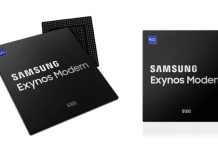Recently, more and more we hear about the success of successive companies in implementing next generation networks, namely 5G. However, these are usually the results of tests performed using different types of test platforms, which take up a lot of space. Nobody has yet integrated the entire 5G modem into a single chip. At least until recently. Qualcomm has just praised the already existing Snapdragon X50 5G modem.
Qualcomm has announced the Snapdragon X50 5G modem a year ago. Already then we knew that it is going to be a chip that works on the new 5G networks operating on 28 GHz millimeter band. The first test of the Snapdragon X50 modem shows throughput a bit above 1.2 Gbps. This is a bit disappointing because the latest LTE-Advanced solutions offer the same. Also, a year ago Qualcomm promised that its 5G modem will pull up as much as 5 Gbps. However, there are no reasons to worry. These are the first test results that show the initial capabilities of a new technology that can be implemented in new smartphones. Qualcomm continues to work on improving its Snapdragon X50 modem. Much information about the current state of work can be deduced from the film material provided by the manufacturer.
At first, we see an X50 modem with 4 cables connected. Could there be 2 separate channels with 2×2 MIMO each?

Spectrum of 5G signal in the 28 GHz band. We have 2 channels of 100 MHz each.

The engineer’s finger indicates the constellation of the 5G signal. This is a simple 64 QAM modulation.

The final result is just 1.24 Gbps.

What did Qualcomm really do? This is a public demonstration of technology that proves that 5G modems working in the 28 GHz band can be used in our smartphones. The 1.24 Gbps result is not surprising, as such values can already be achieved with LTE-Advanced. Qualcomm used a very simple implementation of the 5G NR (New Radio) technology, which differs from LTE only by a wider channel. The theoretical speed that could be achieved with LTE-Advanced under the same conditions (i.e. 200 MHz bandwidth, 64 QAM modulation and 2×2 MIMO) is about 1.5 Gbps. So the current 5G version implemented on Qualcomm Snapdragon X50 is not fast, but it gives us high hopes for the near future.
Source: Qualcomm

























